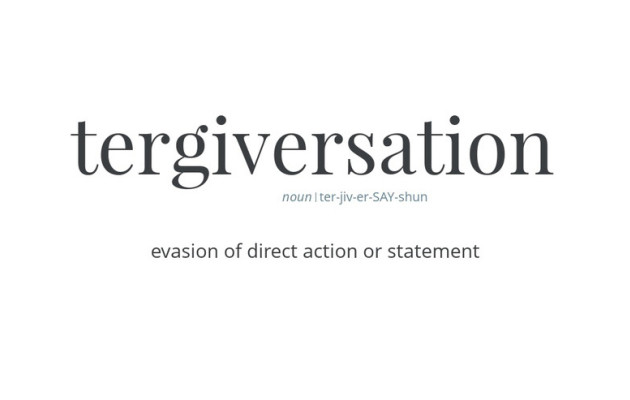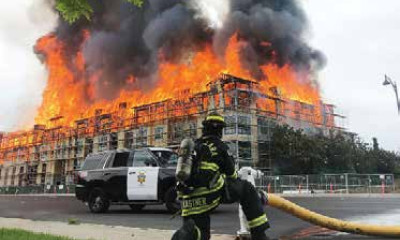A Private Adjuster's Perspective: Tergiversation, Weasel Words, and Your Policy

Wikipedia defines weasel words as an informal term for words and phrases used to create an impression that something specific and meaningful is being said, when in fact something vague or ambiguous is being communicated. Using weasel words may allow one to later deny any specific meaning if the statement is challenged because the statement was never specific in the first place.
“Weasel words can be a form of tergiversation…and may be used…to mislead or disguise….”
Tergiversation is defined as: “evasion of a straightforward…or clear-cut statement; a subterfuge, or evasion…equivocation.” (Webster’s New Collegiate Dictionary; Webster’s New International Dictionary).
Insurance policies are replete with weasel words and tergiversation. For example,
Coverage D (Loss of Use) of your typical Homeowners Policy provides, under the section entitled “Additional Living Expense” as follows:
“If a loss covered under Section 1 makes that part of the ‘residence premises’ where you reside not fit to live in, we cover any necessary increase in living expenses incurred by you…so that your household can maintain its normal standard of living….payment will be for the shortest time required to repair or replace the damaged property….” (ISO Form H0 00 03 03 22).
What is a necessary increase? What is the insured’s normal standard of living? What is the shortest time required to repair or replace the damaged property? There are no hard, fast, or easy answers to any of these questions.
Carriers and their adjusters will often argue that they have the right to make these determinations, but for over 77 years, Adjusters International has argued-- and quite successfully-- that answers to these questions must be seen from the perspective of the insured(s).
Here is what can happen because of the ambiguity:
Let’s call our insureds the Smiths. The Smiths’ home which has a heated pool and separate jacuzzi hot tub was destroyed in a fire. The property was destroyed in a fire. The Smiths found a similar-sized home in the neighborhood. Unfortunately, the rental property did not have a pool or hot tub so the Smith family joined a local gym with pool and hot tub facilities and presented the bill to their carrier.
Note that: Due to lingering back and other muscular issues, this insured under Doctor's suggestions made regular and extensive use of the pool and hot tub.
Another insured; the Jones's had the same experience following their loss, however, this insured has no medical issues necessitating swimming or hot tub use. They just enjoy the occasional use of such facilities.
Is payment for both gym memberships covered under additional living expense coverage?
Greenspan/Adjusters International would argue that both gym memberships are a necessary increase in living expenses However, Jones's carrier might well argue that the gym membership was not necessary.
But words don’t live in a vacuum. Adjusters International would argue-- and, most likely, prevail-- that Jones's normal standard of living included the use of a pool and hot tub regardless of how often used or whether it was medically necessary.
Another issue to be confronted is: for how long shall payment be made? A reputable contractor has estimated that the time to repair or replace the home will be six months. Is that the shortest time required?
Greenspan/Adjusters International-- recognizing the reality of reconstruction work-- would argue that the shortest time required must include permitting time; lead time for labor and materials; time for the final adjustment of the claim; and a myriad of other factors entering into the rebuilding process.
Under the “Duties in The Event of Loss or Damage” Section, under your typical Commercial Property Policy, it is mandated that the Insured:
(2) Give us prompt notice of the loss or damage. Include a description of the property involved.
(3) As soon as possible, give us a description of how, when and where the loss or damage occurred.
(4) Take all reasonable steps to protect the Covered Property from further damage…
(8) Cooperate with us in the investigation or settlement of the claim.” (ISO Form CP 00 10 10 12).
What is prompt? What does as soon as possible mean? What are reasonable steps? How much cooperation is enough? Not enough?
These constitute weasel words, in the classic sense.
Switching to commercial coverages; under the Business Income Coverage section of the typical commercial property policy, states:
1. For Business Income
"We will pay for the actual loss of business income you sustain …during the period of restoration…."
2. For Extra Expenses
b. Extra Expense means necessary expenses you incur during the ‘period of restoration' that you would not have incurred if there had been no direct physical loss or damage to property caused by or resulting from a Covered Cause of Loss….
3. Definitions included in the policy:
‘Period of Restoration’ means the period of time that:
a. Begins (1) 72 hours after the time of direct physical loss or damage for Business Income Coverage; or (2) immediately after the time of direct physical loss or damage for Extra Expense Coverage…and b. Ends on the earlier of: (1) The date when the property should be repaired, rebuilt or replaced with reasonable speed and similar quality ….(ISO Form CP 00 30 10 12; emphasis mine).
All of this includes more weasel words for the insured to deal with and master, including necessary, reasonable speed, similar quality.
Why are weasel words and the acts of tergiversation used when dealing with such an important document as an insurance policy-- a legal contract?
Among the many explanations offered to explain these phenomena, a few come quickly to mind; including:
- The author(s) of these policies are inexperienced and lack the skill or experience to draft clear-cut policy provisions;
- To be more specific and clear-cut, policies might number into the several hundreds or even thousands of pages and begin to look like encyclopedias.
- And the most sinister explanation of all: insurers intentionally use vague and ambiguous terms in order to have the ability to interpret coverage once claims are presented.
Whatever the reason(s), whenever a loss occurs, an insured will be confronted with a multitude of weasel words. Insureds clearly need professional representation to deal with this fact of life.
For almost a century, Greenspan/Adjusters International has dealt with these considerations and argued for interpretations most favorable for its clients. Adjusters International has the requisite expertise dealing with the carriers’ weasel words, in order to advocate for the best possible settlements.








